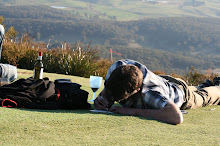Boris is dead. I found him. He was sitting in his spotted armchair. Not sleeping. Dead. Appearing to be asleep. But not asleep. Dead. He didn't come to bingo. He said he was going to come to bingo but he didn't come to bingo. We spoke earlier in the afternoon. He was working on another wall. I said it was that time of the month again, come on, let's go have a drink together, and just listen to the numbers as they come up, they might remind us of old phone numbers in our lives, that kind of thing, and bring up associated memories, and what not, who knows. He chuckled at the phone number idea but all the same said he'd come. But he didn't, he didn't come. Numbers were being called. I surreptitiously sank some sauvignon blanc and then snuck out the side entrance between the calling of numbers. There was no answer at his door. Boris, I said, between knocks. Boris, Boris. But still no answer. I knew he wouldn't have been outside, it was getting too late, the sun was setting, the wind was picking up, and history showed that he would have by now called it a day, he would have by now popped a stout bottle open and quietly supped from a glass (in the meanwhile) before his early evening comedy came on. Boris. Boris, come on, open up. So I turned the knob and found it unlocked. And there he was, upright in his armchair. I knew as much then as I ever would. The crux of the matter being that I had to get out. No, not the room necessarily, but the whole place. The retirement village. There was something wrong with the whole set up, the whole idea that these elderly live out their last breaths surrounded by one another, each in a lonely room, with framed photographs on the walls of family and better times. There was just the other day the man in 23 needing a lightbulb changed, and the handyman was away, so I said I'd take care of it. He was a teacher in times past. On the wall were framed photos of his family, as well as framed handwritten poems from his students over the years, and what looked like framed examples from students' exercise books. English composition. Spelling. Comments on Blake's Songs of Innocence. Earlier in the day I'd been talking with the woman in unit number 17 again. She'd mentioned how in Yorkshire during the Second World War she and her co-workers at the bank would take it in turns to go up onto the roof after hours to help keep watch for German planes. I want to fly away. I want to fly again. I want to fly away, Boris. Boris, look at you. In your lap a piece of paper, betwixt thumb and forefinger, unfolded, and the prominent creases reminding me of the streets in a simple well laid out city in which I might like to one day take a casual tram ride around, cold bottle of beer in hand, cute girl by my side, and a conductor checking tickets with the gab of one Harpo Marx. Boris, come on, wake up. But he wouldn't wake up, of course he wouldn't, he was dead. Come on, man, he's dead. Get it together. So I took the piece of paper from his lap and carefully folded it back up, put it inside my inside coat pocket and then went back to the recreation hall to go look for Mrs Shearer and let her know what had happened. She was in between calling out numbers again. I went up and whispered about Boris, and she nodded and then went about calling the next number. Then someone called out bingo. Motioning me with a tilt of her head, I followed her to the head office and she closed the door behind me. Are you sure? she wanted to know. Yes, I'm sure, I replied. They're not supposed to do that here, she said, and which I took to mean to die. They're supposed to be able to look after themselves, she said, they're supposed to be in better health than that, otherwise we would have sent them elsewhere. A hospital, or one of those places where there's a nurse to take care of your needs, feed you, wash you, if necessary, that kind of thing. Then her cheeks suddenly went red and she started crying. I was about to tap her on the shoulder and say 'There there', but something better immediately came along and told me to do otherwise, which meant to do nothing. And I had no idea if she even knew Boris.
skip to main |
skip to sidebar
Albuquerque, etc
INDEX
ARCHIVE
-
▼
2009
(68)
-
▼
July
(17)
- COMMENTARIES, 6
- COMMENTARIES, 5
- COMMENTARIES, 4
- COMMENTARIES, 3
- COMMENTARIES, 2
- MARGINALIA, 2
- MARGINALIA, 1
- COMMENTARIES, 1
- A YELLOW INSERT
- THAT WHICH AILS YOU BRINGS YOU CLOSER, 3
- THAT WHICH AILS YOU BRINGS YOU CLOSER, 2
- THAT WHICH AILS YOU BRINGS YOU CLOSER, 1
- THE CONDUCTOR
- THE COMPLETE SHORTER WORKS OF LOUIS ALBUQUERQUE
- IT WAS HERE THAT I LEARNED HOW MEMORY
- TILL THE LAST TRICKLE
- KEY OF THE DOOR
-
▼
July
(17)



